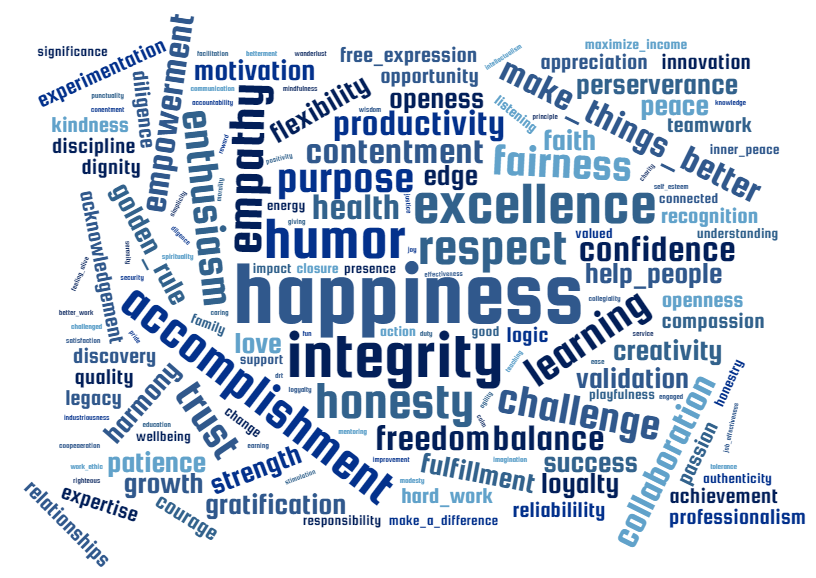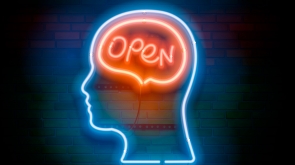
Hey Company, Know Thyself
CEO of Enstoa
It is fascinating that a team culture is born out of the shared beliefs and values of the very individuals that fall under its influence. Almost paradoxically, the creation governs the creators. Said another way, the values driving culture motivate, nourish, and even moderate its own creators, the individuals within the organization.
In a recent blog, “When Values Clash, it is the People that Suffer,” I used the phrase organic values to describe the unspoken and natural values that really drive organizational culture, behaviors, and attitudes. This begs the hugely important question, how can we know and document organic values?
Getting into Group Consciousness
To evaluate a method or process to “know the group,” it will be useful to think of the group (or team, or organization) as an individual with a mind of its own. Groups, like individuals, possess a conscious and unconscious mind. Groups even have hopes, fears, ambitions and ghosts in closets. Positive experiences fuel a group’s confidence, bad experiences make a group fearful and insecure.
I believe organic values operate at the unconscious level within a group. The leader who doesn’t dig into the real personality of the group takes things on appearances only and ends up leading the wrong group. Strategies fail, morale is bad, and people shift from doing the maximum possible to the minimum allowable. We must first acknowledge a group has an unconscious spirit before we can try to know it.
A Precept from Heaven
The ancient Greeks put a lot of emphasis on self-knowledge and introspection. “Know thyself,” was inscribed on the Temple of Apollo at Delphi and Juvenal, the poet, said, “This precept descended from Heaven: know thyself.” Extending this sage advice to the group concept, it is paramount for an organization to have an accurate pulse on the underlying values and culture that drive behaviors, the esprit de corp!
We think creatively and embrace change at Enstoa and in January 2016 decided to run an ambitious experiment to document our organic values. Juvenal would be proud of us! I asked a former professor of mine from Columbia Business School, Professor Paul Ingram, to run his values hierarchy workshop at our annual Spark event where we reignite relationships and roll out the fiscal year strategy.
A Window into our Culture
Professor Ingram’s methodology helped individuals create a values hierarchy and answer questions like, “What are my most important values? What is my CEO value (the top value in the hierarchy)?” With our CEO value at the top, each of us created a personal hierarchy containing our top eight values.
This exercise, documented more fully in the blog, “How We Ignited 2016,” by my colleague, Kerry Foley, allowed us to understand our collective values as individuals within an organization. We were able to empirically calculate and quantify the culture of Enstoa. We were able to know ourselves, to know our organic values.
Penetrating Knowledge of Ourselves
The individual or organization that sets out on journey of self-discovery rarely finds the finish line. For us regular folk, we’re unlikely to obtain the praise that Sigmund Freud showered upon Friedrich Nietzsche that he “had a more penetrating knowledge of himself than any other man who ever lived or was ever likely to live.” But the journey of knowing self, of understanding the team’s organic values, is so important and rewarding that it should be pursued as a top organizational priority for company boards, leaders and employees.
The creators of Enstoa’s culture, our teammates over the last eight years, now very proudly understand who we are. The stage is set for us to use the aggregated individual values (represented in the word cloud below) as the raw material to create with confidence and proclaim boldly to the world our values.

It is fascinating that a team culture is born out of the shared beliefs and values of the very individuals that fall under its influence. Almost paradoxically, the creation governs the creators. Said another way, the values driving culture motivate, nourish, and even moderate its own creators, the individuals within the organization.
In a recent blog, “When Values Clash, it is the People that Suffer,” I used the phrase organic values to describe the unspoken and natural values that really drive organizational culture, behaviors, and attitudes. This begs the hugely important question, how can we know and document organic values?
Getting into Group Consciousness
To evaluate a method or process to “know the group,” it will be useful to think of the group (or team, or organization) as an individual with a mind of its own. Groups, like individuals, possess a conscious and unconscious mind. Groups even have hopes, fears, ambitions and ghosts in closets. Positive experiences fuel a group’s confidence, bad experiences make a group fearful and insecure.
I believe organic values operate at the unconscious level within a group. The leader who doesn’t dig into the real personality of the group takes things on appearances only and ends up leading the wrong group. Strategies fail, morale is bad, and people shift from doing the maximum possible to the minimum allowable. We must first acknowledge a group has an unconscious spirit before we can try to know it.
A Precept from Heaven
The ancient Greeks put a lot of emphasis on self-knowledge and introspection. “Know thyself,” was inscribed on the Temple of Apollo at Delphi and Juvenal, the poet, said, “This precept descended from Heaven: know thyself.” Extending this sage advice to the group concept, it is paramount for an organization to have an accurate pulse on the underlying values and culture that drive behaviors, the esprit de corp!
We think creatively and embrace change at Enstoa and in January 2016 decided to run an ambitious experiment to document our organic values. Juvenal would be proud of us! I asked a former professor of mine from Columbia Business School, Professor Paul Ingram, to run his values hierarchy workshop at our annual Spark event where we reignite relationships and roll out the fiscal year strategy.
A Window into our Culture
Professor Ingram’s methodology helped individuals create a values hierarchy and answer questions like, “What are my most important values? What is my CEO value (the top value in the hierarchy)?” With our CEO value at the top, each of us created a personal hierarchy containing our top eight values.
This exercise, documented more fully in the blog, “How We Ignited 2016,” by my colleague, Kerry Foley, allowed us to understand our collective values as individuals within an organization. We were able to empirically calculate and quantify the culture of Enstoa. We were able to know ourselves, to know our organic values.
Penetrating Knowledge of Ourselves
The individual or organization that sets out on journey of self-discovery rarely finds the finish line. For us regular folk, we’re unlikely to obtain the praise that Sigmund Freud showered upon Friedrich Nietzsche that he “had a more penetrating knowledge of himself than any other man who ever lived or was ever likely to live.” But the journey of knowing self, of understanding the team’s organic values, is so important and rewarding that it should be pursued as a top organizational priority for company boards, leaders and employees.
The creators of Enstoa’s culture, our teammates over the last eight years, now very proudly understand who we are. The stage is set for us to use the aggregated individual values (represented in the word cloud below) as the raw material to create with confidence and proclaim boldly to the world our values.




